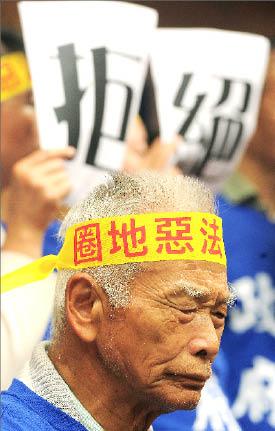The Taiwan Rural Front (TRF) and farmers yesterday protested the passing of proposed revisions to the second reading of the Land Expropriation Act (土地徵收條例) and called Premier Wu Den-yih (吳敦義) a “liar” for failing to include certain items into the Cabinet version revisions that they said he had promised.
“When meeting with us in July, Wu promised that he would hold further talks on revisions to the Land Expropriation Act to listen to what farming rights advocacy groups and farmers had to say,” said Liao Pen-chuan (廖本全), an associate professor at National Taipei University’s Department of Real Estate and Built Environment, at a news conference at the Legislative Yuan.
“Months have passed by, and the next thing we heard about the law is that the proposed revisions have been incorporated into the second reading without going through the first reading process,” Liao said.

Photo: Liu Hsin-de, Taipei Times
Liao, a TRF member, was one of those who spoke to Wu in a meeting at the Executive Yuan where the TRF staged a protest in July.
According to Taiwan’s legislative system, a proposed bill or amendment is introduced to the legislature in a first reading, in which the lawmaker or government official who proposed the bill or the amendment introduces the amendments before it goes to further committee review and debate in a second reading.
A proposed bill or amendment is often a foregone conclusion by the time it reaches the second reading, after which it is sent to the general assembly at the Legislative Yuan for the third reading and a final vote before it becomes law.
“Wu is practically a liar, because he never called a meeting with non-governmental organizations [NGO] as he promised and sent the proposed amendments straight for a second reading on Thursday,” Liao said.
Thomas Chan (詹順貴), another member of the TRF and an attorney who represents farmers and farming activists in lawsuits, agreed with Liao that Wu is a liar, but said it was for a different reason.
“We NGOs also proposed our version of revisions to the law, which included clauses requiring developers to clarify the ‘necessity’ and ‘public interests’ involved before a land expropriation deal could be approved by the government,” Chan said. “We also wanted third-party real-estate appraisers to estimate the value of land to be seized by the government.”
While Wu said he accepted the TRF’s ideas, “none of what we wanted made it into the Cabinet--proposed amendments,” Chan said.
Miaoli County’s Wanbao Self-Help Association president Chen Hsing-hsiung (陳幸雄) called on lawmakers and the government to include clauses proposed by farming rights groups to better protect people’s rights to their lands.
Wanbao Borough (灣寶) of Miaoli County’s Houlong Township (後龍) was one of the farming villages facing government seizure of their land for development projects.
The Wanbao crisis was resolved when the Ministry of the Interior rejected the development project, but Wanbao residents are still familiar faces supporting others struggling against land expropriation.

Alain Robert, known as the "French Spider-Man," praised Alex Honnold as exceptionally well-prepared after the US climber completed a free solo ascent of Taipei 101 yesterday. Robert said Honnold's ascent of the 508m-tall skyscraper in just more than one-and-a-half hours without using safety ropes or equipment was a remarkable achievement. "This is my life," he said in an interview conducted in French, adding that he liked the feeling of being "on the edge of danger." The 63-year-old Frenchman climbed Taipei 101 using ropes in December 2004, taking about four hours to reach the top. On a one-to-10 scale of difficulty, Robert said Taipei 101

Nipah virus infection is to be officially listed as a category 5 notifiable infectious disease in Taiwan in March, while clinical treatment guidelines are being formulated, the Centers for Disease Control (CDC) said yesterday. With Nipah infections being reported in other countries and considering its relatively high fatality rate, the centers on Jan. 16 announced that it would be listed as a notifiable infectious disease to bolster the nation’s systematic early warning system and increase public awareness, the CDC said. Bangladesh reported four fatal cases last year in separate districts, with three linked to raw date palm sap consumption, CDC Epidemic Intelligence

Two Taiwanese prosecutors were questioned by Chinese security personnel at their hotel during a trip to China’s Henan Province this month, the Mainland Affairs Council (MAC) said yesterday. The officers had personal information on the prosecutors, including “when they were assigned to their posts, their work locations and job titles,” MAC Deputy Minister and spokesman Liang Wen-chieh (梁文傑) said. On top of asking about their agencies and positions, the officers also questioned the prosecutors about the Cross-Strait Joint Crime-Fighting and Judicial Mutual Assistance Agreement, a pact that serves as the framework for Taiwan-China cooperation on combating crime and providing judicial assistance, Liang

US climber Alex Honnold left Taiwan this morning a day after completing a free-solo ascent of Taipei 101, a feat that drew cheers from onlookers and gained widespread international attention. Honnold yesterday scaled the 101-story skyscraper without a rope or safety harness. The climb — the highest urban free-solo ascent ever attempted — took just more than 90 minutes and was streamed live on Netflix. It was covered by major international news outlets including CNN, the New York Times, the Guardian and the Wall Street Journal. As Honnold prepared to leave Taiwan today, he attracted a crowd when he and his wife, Sanni,